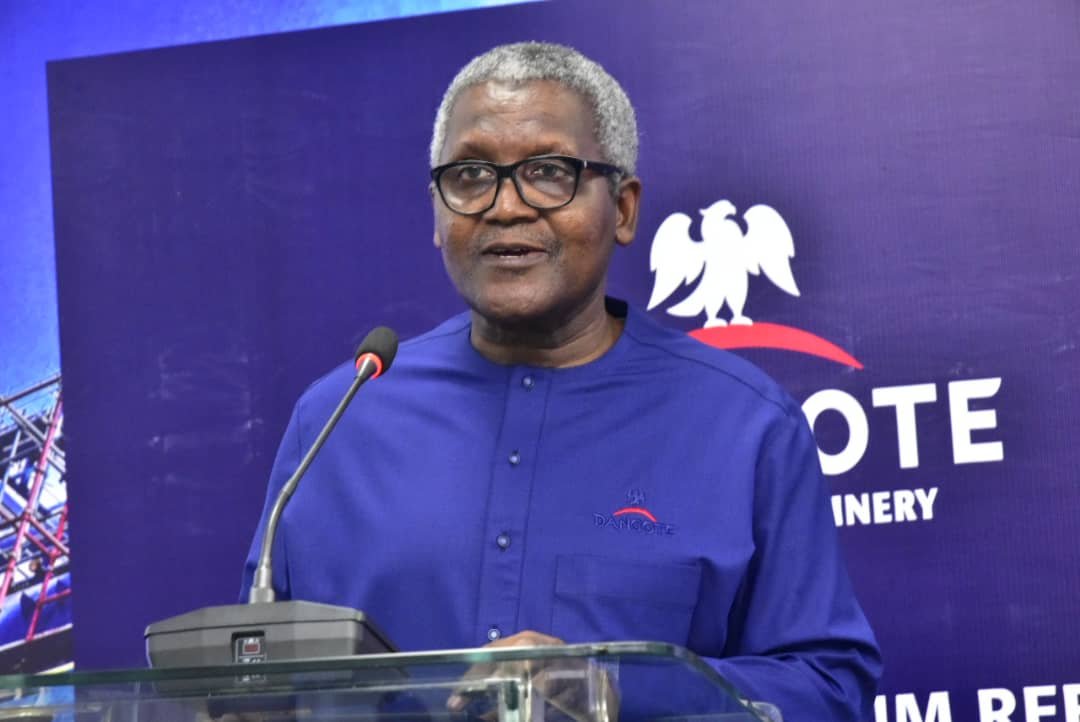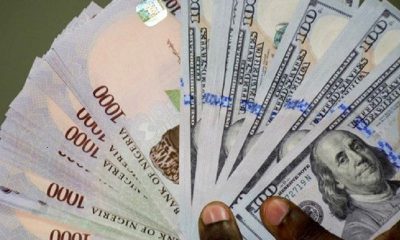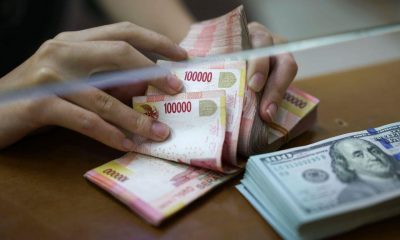Economy
Naira Drops to N850/$ as BDC Operators Transact Business in Fear

By Dipo Olowookere
The Nigerian Naira is now being battered from different directions, further weakening its value against the United States Dollar at the parallel market.
While the Nigerian currency was still battling with a shortfall in the supply of foreign exchange (FX) in the financial system, the Central Bank of Nigeria (CBN) last Wednesday announced plans to introduce new designs of the N200, N500, and N1,000 notes into the system.
This announcement plunged the value of the domestic currency in the market as those who had stashed the Naira at home were looking for Dollars to exchange it with.
As the local currency was still strategizing out ways to survive this pressure, the Economic and Financial Crimes Commission (EFCC) on Tuesday added fuel to the fire by arresting some Bureaux De Change (BDC) operators in Abuja and Kano, with plans to carry out similar raids in Lagos and other cities.
This has sent panic into the market and has made forex traders at the black market transact business in fear.
On Wednesday in Lagos, the Naira was exchanged to the American currency at N850/$1 compared with the N816/$1 it was traded on Tuesday.
This has been attributed to the action of the anti-money laundering agency.
“This action [of the EFCC] will only worsen the already tensed situation,” one of the FX hawkers in Lagos, who asked not to be named, told Business Post this afternoon.
“We have been on this road before, it is not new to us. They would soon be tired, but if they continue, I can tell you for free that the Naira will hit N1,000 before the end of this year,” another trader said, also asking not to be named.
This is not the first time security operative have gone after forex traders at the black market, which the CBN describes as an insignificant part of the FX market.
“For the information of everybody, parallel market, as far as we know it and the data that we have, is a shallow market in Nigeria with no more than 5 per cent of market share.
“Parallel market and quote me is a tainted market in Nigeria, where people who desire to deal in illegal foreign exchange transactions including sourcing of FX cash for purposes of offering bribes, corruption, that is where they deal,” Mr Godwin Emefiele, the head of Nigeria’s central bank, once said about two years ago.
The inability of customers to access FX from commercial banks had always pushed them to the black market.
This newspaper recently reported that the scarcity of forex had forced banks to ration FX in cash to customers, resorting to electronic transfer.
Economy
Dangote Eyes Expansion into Steel, Power, Ports for Large-Scale Manufacturing

By Modupe Gbadeyanka
African industrialist, Mr Aliko Dangote, is setting his eyes on steel production, electricity generation and port development to support large-scale manufacturing and trade.
He told The New York Times in a recent interview that his ambition is to accelerate industrialisation across Africa.
He currently has business interests in cement, sugar, salt, fertiliser, and petrochemicals, with his latest project being the $20 billion Dangote Petroleum Refinery and Petrochemicals in Lagos, which produces about 650,000 barrels of refined products daily.
The businessman said his long-term goal is to deepen the continent’s manufacturing base beyond oil refining and position it as a global industrial force.
“We have to industrialise Africa,” Mr Dangote said, noting that his next focus areas include the steel industry, expanding access to electricity and building additional port infrastructure to support large-scale manufacturing and trade.
Industry analysts say entry into steel would position the group in a sector critical to infrastructure, housing and heavy industry, while investments in power and ports could address two of Nigeria’s most persistent constraints to economic growth.
Mr Dangote cited India’s Tata Group as a model for diversified industrial expansion, describing the conglomerate’s multi-sector footprint as an example of how large-scale manufacturing can transform emerging economies.
Beyond expansion, Mr Dangote said job creation remains central to his strategy. With Nigeria projected to require between 40 and 50 million new jobs by 2030, he argued that large-scale industrial projects are essential to absorbing the country’s growing youth population.
The refinery alone currently employs about 30,000 workers, approximately 80 per cent of them Nigerians. Expansion across new sectors is expected to raise total employment within the group to about 65,000.
Mr Dangote also announced plans to list shares in the refinery on the Nigerian stock market, a move that would broaden local participation in the asset.
Despite progress, he acknowledged that infrastructure gaps and crude supply challenges remain obstacles. He has previously raised concerns about logistics bottlenecks and inefficiencies in the oil value chain that complicate feedstock supply to the refinery.
Nevertheless, he said the group would continue to invest aggressively in sectors that reduce import dependence and retain economic value within Africa.
“Nobody dared to do it, so we did it,” he said, reiterating his belief that large-scale private investment is key to transforming Nigeria’s industrial landscape.
With cement plants operating across multiple African countries and a refinery that has reshaped Nigeria’s downstream outlook, Mr Dangote’s next push into steel, electricity and port infrastructure signals a new phase in his ambition to industrialise the continent.
Economy
SEC Revokes Operating Licence of Kensington Agro Trading Ltd

By Aduragbemi Omiyale
The operating licence of a capital market operator, Kensington Agro Trading Limited, has been revoked by the Securities and Exchange Commission (SEC).
The capital market regulator, in a circular dated February 09, 2026, disclosed that the action “pursuant to the powers of the commission under Section 61(6) of the Investments and Securities Act, 2025, and Rule 34(1) of the SEC Rules and Regulations 2013, as amended.”
The disclosure noted that the revocation of the licence of the company was “with immediate effect.”
The reason for withdrawing the operating licence of Kensington Agro Trading Limited was not stated in the notice.
“The Securities and Exchange Commission hereby notifies the general public of the revocation of the registration of Kensington Agro Trading Limited as a capital market operator (Commodity Broker/Dealer and Collateral Manager) with immediate effect.
“The revocation of the company’s registration is invoked pursuant to the powers of the Commission under Section 61(6) of the Investments and Securities Act, 2025, and Rule 34(1) of the SEC Rules and Regulations 2013, as amended.
“Accordingly, Commodity Exchanges, the investing public, commodity traders, and all Capital Market Stakeholders are advised to discontinue capital market-related dealings with the company,” the circular signed by the management noted.
Economy
CBN Data Shows 25% Drop in Nigeria’s Oil Earnings to N877bn in December

By Adedapo Adesanya
The latest off-cycle data released by the Central Bank of Nigeria (CBN) has revealed that Nigeria’s revenue from the oil and gas industry dipped by 25.04 per cent to N877.176 billion in December 2025, compared with N1.17 trillion received from energy firms in November 2025
In its presentation to the Federation Account Allocation Committee (FAAC) on receipts and expenditures for December 2025, the CBN disclosed that the amount earned from the oil and gas industry in the month under review represented 95.65 per cent of the sector’s budgeted revenue of N917.064 billion for the month.
In comparison, revenue from the petroleum industry in November 2025 accounted for 96.38 per cent of the N1.474 trillion budgeted for the sector in November 2025.
Providing a breakdown of revenue from the industry in December 2025, the CBN stated that the country earned N772.727 million from crude oil sales, dropping by 97.92 per cent from N37.134 billion recorded in November 2025; while the it recorded revenue of N9.019 billion from gas sales, rising by 24.14 per cent from N7.265 billion recorded in November.
Furthermore, the financial sector apex regulator noted that revenue from crude oil royalties dipped by 12.52 per cent to N514.288 billion in the month under review, from N587.865 billion recorded in the previous month; while receipts from miscellaneous oil revenue grew by 97.5 per cent to N2.678 billion in December 2025, from N1.356 billion in the previous month.
It also stated that royalties from gas appreciated by 124.91 per cent to N21.153 billion in December, from N9.405 billion in November 2025; revenue from gas flared penalties stood at N48.858 billion, down by 5.76 per cent from N51.842 billion in November, while revenue from Companies’ Income Tax (CIT) from upstream oil industry operations stood at N73.066 billion, as against N106.106 billion in the previous month.
The CBN further revealed that revenue from Petroleum Profit Tax (PPT) stood at N79.247 billion; rentals – N1.5 billion; while taxes stood at N126.594 billion, compared with N301.471 billion. N775.162 million, and N67.242 billion, respectively, in November 2025.
In addition, the CBN reported that from the country’s oil and gas revenue in December 2025, N18.163 billion was deducted for 13 per cent refund on subsidy, priority projects and Police Trust Fund from 1999 to 2021; while N8.761 billion was deducted by the Nigerian National Petroleum Corporation Limited (NNPCL), in respect of its 13 per cent management fee and frontier exploration fund.
It added that N23.724 billion was deducted and collected by the Nigerian Upstream Petroleum Regulatory Commission (NUPRC) in December 2025, being four per cent of the cost of collection; while N46.903 billion was transferred to the Midstream and Downstream Gas Infrastructure Fund from gas flared penalties in the same month.
-

 Feature/OPED6 years ago
Feature/OPED6 years agoDavos was Different this year
-
Travel/Tourism10 years ago
Lagos Seals Western Lodge Hotel In Ikorodu
-

 Showbiz3 years ago
Showbiz3 years agoEstranged Lover Releases Videos of Empress Njamah Bathing
-

 Banking8 years ago
Banking8 years agoSort Codes of GTBank Branches in Nigeria
-

 Economy3 years ago
Economy3 years agoSubsidy Removal: CNG at N130 Per Litre Cheaper Than Petrol—IPMAN
-

 Banking3 years ago
Banking3 years agoSort Codes of UBA Branches in Nigeria
-

 Banking3 years ago
Banking3 years agoFirst Bank Announces Planned Downtime
-

 Sports3 years ago
Sports3 years agoHighest Paid Nigerian Footballer – How Much Do Nigerian Footballers Earn



















